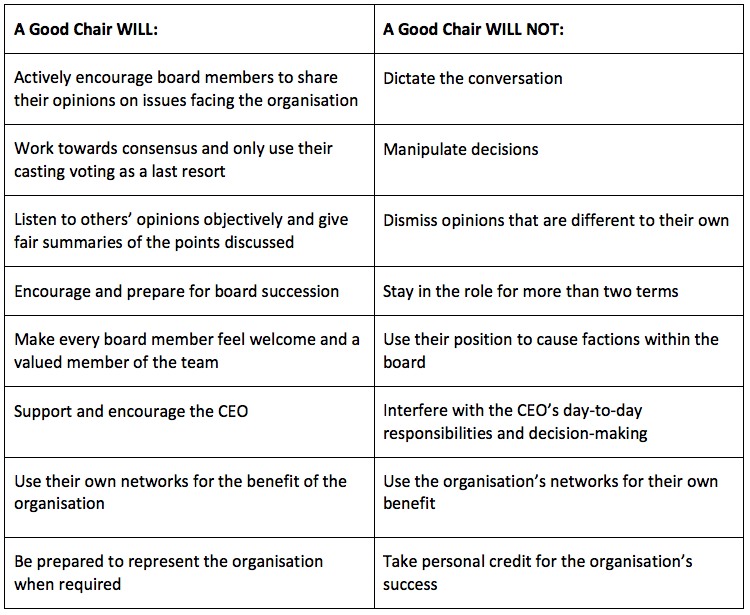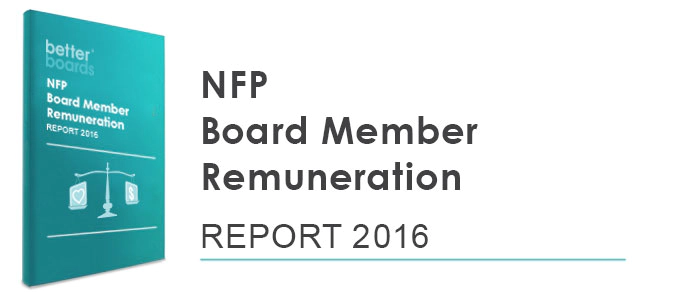leadership
Three Cheers for the Chair
Published: July 11, 2016
Read Time: 5 minutes

Every board member has an important role to play in the governance of your organisation, but it is your board Chair who has the greatest influence over the culture and focus of your board activities. As such it is crucial that boards carefully consider their Chair’s appointment and make sure they choose the right person for the job.
When discussing the role of Chair for your organisation, there are several things you may want to consider.
What exactly is the Chair’s role?
In a nutshell, the role of the Chair is one of leadership. While in most cases they have no more say in activities than other board members, they are responsible for leading the board and setting the tone for how things are done. As with all leadership positions, their attitude dictates the culture of the organisation.
The Chair’s specific responsibilities may vary between organisations, but it is likely that your Chair will be responsible for facilitating meetings, liaising between the board and the CEO, acting as a spokesperson for the organisation and ensuring board resolutions are carried out. They may also be responsible for appointing chairs for sub-committees and inducting new members to the Board.
In order for your Chair to do their job well, you need to have a clear job description for the role. This ensures the Chair knows what is expected of them and you have some guidelines by which to measure their performance.
What skills and characteristics should a Chair have?
Like all board members, your Chair should have a sound understanding of your organisation’s Vision and Mission, as well as a passionate commitment to the cause. In addition to these baseline expectations, your Chair should demonstrate the following skills and characteristics:
Leadership Qualities
A good Chair is able to inspire the rest of the board to bring their best self to the table. They lead by example and actively encourage board members to hold themselves to high standards. A good Chair consistently acts in a professional manner and is noted for their integrity in everything they do.
Objectivity
When discussing issues at a board level, your Chair must be able to view each of the board members’ opinions objectively and summarise the discussion points without personal bias. While they (like other board members) are entitled to their own opinion, they need to be able to express it as just another point of view, and give it no more or less weight than other opinions around the table.
Brilliant Communication
Not only do board Chairs need to direct or facilitate the conversation around the board table, they must be able to communicate well with individuals as well. Whether it’s the CEO, other board members or stakeholders from outside of the organisation, your Chair needs to have excellent communication skills and be willing to communicate with others in a clear, open manner. Diplomacy and approachability are essential.
Conflict Resolution Skills
When you have a team of smart, passionate people running an organisation, there will always be issues that cause tension or disagreement. Left unchecked, disagreement can quickly turn into in-fighting between board members, and there is no faster way to disable an organisation. It is essential that your board Chair is comfortable in addressing conflict and facilitating a resolution in a positive way.
Networking Skills
Along with your CEO, your Chair is often the face of your organisation, so they need to be able to meet, greet and network well. Not only should your Chair feel comfortable shoulder-tapping existing networks for support, they should have the skills and confidence to help grow the organisation’s networks as well.
Availability
Done well, the role of the Chair can be quite time-consuming and certainly requires more commitment than a monthly meeting. Your Chair needs to be able to support the CEO as and when required, so being available for meetings and appointments is critical for the organisation’s success. While the board’s role is to govern, not manage – the Chair’s role is usually more hands on than that of the other board members.

Do you have the right appointment process?
Depending on your constitution, appointing your Chair can happen in all sorts of ways. For some organisations the Chair is nominated by fellow board members and voted in at a board level. Whereas for others, any person can stand for Chair at the Annual General Meeting and it is the organisation’s wider membership that controls the voting process. Both appointment models have their pros and cons, but in my opinion having board members elect their Chair usually results in a much better appointment.
If your Chair is currently elected by your wider membership, you need to make sure that all members properly understand the role and are clear about the skills, expertise and characteristics required to do the job well. Without this information, the election can quickly become a popularity contest (or a political protest) and the person elected may not necessarily be the right person for the job.
How long is too long?
Regardless of how fantastic your Chair may be, there comes a time when they should move on in order to allow fresh perspectives within the organisation. For some people this ‘moving on’ is a difficult process, especially if it feels like there is no other person who is willing or able to take on the role. Ironically, as soon as they move on, the right people tend to step up and fill the gap.
While there is no one-size-fits-all length of service, I believe 3-5 years is more than sufficient for someone chairing a non-profit organisation. Any longer than that and you run a real risk of Founder’s Syndrome creeping in – if it hasn’t already! You may also miss out on valuable leadership skills that other board members can bring to the table.
Having a clear Term of Service makes it easier for people to move on from the role without feeling responsible for what happens after they leave. It also provides some security against Chairs who don’t want to move on, even though they should.
Share this Article
Recommended Reading
Recommended Viewing
Author
-
Managing Director
Exult
- About
-
Kerri was previously the Managing Director of Exult Ltd, one of New Zealand’s leading training providers for the non-profit sector. She has been involved in the third sector for 20 years and has experienced the difference a skilled Chair can make to an organisation. Kerri facilitates the Exult Governance workshops and enjoys working with new Boards to develop their capabilities.
Found this article useful or informative?
Join 5,000+ not-for-profit & for-purpose directors receiving the latest insights on governance and leadership.
Receive a free e-book on improving your board decisions when you subscribe.
Unsubscribe anytime. We care about your privacy - read our Privacy Policy .










